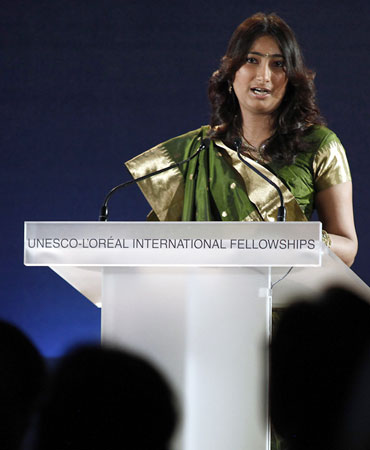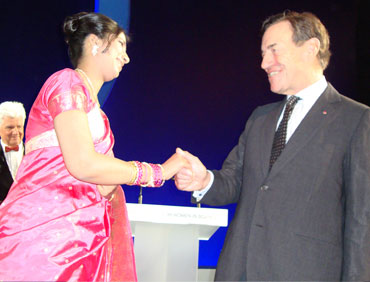
Early this March, Dr Antima Gupta stood facing a crowd of some rather fashionable people at the L'Oreal headquarters in Paris. Dressed in a sari, she spoke about tuberculosis and its growing threat to the world.
Gupta is an unlikely face for the international cosmetics brand that counts stunners such as Aishwarya Rai Bachchan and Sonam Kapoor amongst its ambassadors. However the 29-year-old scientist born in small town India best reflects the country's aspirations and its successes. Her Parisian sojourn was to receive the L'Oreal-UNESCO for Women in Science Fellowship. The grant that has honoured 90 women across continents over the last 12 years has seen only two Indian recipients (Professor Indira Nath from the Institute of Pathology (ICMR), Safdarjung Hospital Campus in New Delhi being the other one).
Through this fellowship, Dr Anitma Gupta will be able to pursue her post-doctoral research in tuberculosis at the Department of Biological Sciences, Birkbeck in the University of London.
Daughter of a college lecturer in Saharanpur, Uttar Pradesh Gupta is the youngest of three children. A Benaras Hindu University (BHU) Biotechnology graduate, she completed her PhD from Central Drug Research Institute (CDRI) in Lucknow.
When she'd applied for the L'Oreal-UNESCO fellowship in May last year, Gupta hadn't thought she'd win it. And now that she has, the feeling is yet to sink in.
This isn't however the first time that Gupta has won a scholarship. "My father was a lecturer and we couldn't afford expensive education. I got through my school, college and even the university solely on scholarships. As a kid I wasn't the brightest but was definitely a student with distinction grades. When I finished schooling I was hoping to become a medical practitioner. The grades were fine but they were not good enough to get funding and I didn't want my father to pay for my education. Research was the next best option. I completed my post-grad in Biotechnology from BHU and pursued my doctoral thesis from CDRI in Lucknow," she says.

At CDRI, she chose to work on the tuberculosis bacteria. "It is a major issue because TB is a deadly disease that can spread rapidly. A lot of people asked me why I chose TB when there were other (deadlier) diseases. But the truth is in the recent past, a drug-resistant TB bacteria has emerged, making the disease more complicated to deal with."
So when Gupta won the L'Oreal-UNESCO Fellowship her choice of topic was obvious. She wanted to take her thesis forward and create a drug resistant model for scientists to work on.
In London, Gupta will investigate the potential of another bacteria (Mycobacterium aurum from the Mycobacterium tuberculosis family that causes TB) as a surrogate model for drug screening. She tells us that while the bacterium does not cause disease, it has the similar susceptibility as well as drug resistant mechanism so far known to the existing drugs.
As she explains the nature of her work, Gupta's voice perks up. The quiet demeanour in her voice gives way to excitement. "This means it could be used for testing new treatments for TB and will effectively reduce cost, time and risk of experiments," she says.
Post-doctoral research had been on Gupta's mind for a long time. In 2008, soon after she'd finished writing out her PhD thesis, she lost out on an opportunity to go to the US. "My thesis was ready in September 2008 but because of some administrative issues, I wasn't able to submit it till January the following year. It prevented me from applying for a post-doc grant at an American university. I felt rather down and out and decided to give myself some time to cope with the situation. This was also when I felt the need to settle down and get married."

Thus began a search for a suitable boy. At 27, Gupta was past the 'marriageable age' in India. And a place like Saharanpur would have possibly been buzzing about a girl 'past her prime and still not married'. If she was the talk of the town, Antima Gupta hadn't known it. Her parents had shielded her from all the gossip. "(Neither) pressurised me (to tie the knot). In fact my mother has been extremely supportive. She encouraged me to take up further studies, gave me moral support when I needed it and stood by me all along. When I went to Varanasi (to study at BHU) I felt extremely homesick. It was the first time I had been away from home and was finding it difficult to cope with things. During those days, she would be on the phone all the time (counselling me). Rest of the family supported me too. They never asked me why I was returning home late in the evenings because they knew I was working. I had been given a two-wheeler and was free to pursue my dreams."
Even when it was time for her to get married, they all looked out for someone who was not just well qualified but also understanding. That boy was Dr Rajiv Gupta, pursuing his post-doc in computer science, in Lucknow. They found his profile on a matrimonial website. And quite like the way they show in the movies Antima's family travelled to the groom's house first to meet his family. Then the couple met. They spoke about their work and though neither was very aware about the other's area of research, both knew that they'd met their soul mate.
"I wanted someone who could appreciate if not understand what I was doing. Rajiv has been very supportive. Even though it isn't his field, he likes to know what I am doing and takes interest in it. I find marriage to be a stabilising force in my life," she says.
Months after they got married, Antima followed Rajiv who works in as a development engineer in Sony Corporation to London. "Right from my early days, I always got to choose the educational institution. BHU and CDRI were my first options. And when the L'Oreal-UNESCO Fellowship came through, I chose University of London."
Gupta says she loves the place. She doesn't feel homesick, definitely not after having lived away from home for so long. Instead she likes to focus on her job. "Each week I set targets for myself. If I achieve them, I feel glad. If not, I work harder. It's the one thing that has kept me going for so many years. My professors always told me there was no substitute for hard work. Clich d as it may sound but there really isn't."
At 29 Gupta has learnt another thing -- the ability to adapt. She says if her soul mate was someone who lived in a small village, she'd have happily moved there. "If the man was willing to respect me and my work, I would have followed him even to his village. I'd have started a pathology lab and continued to work there."
In London though, life has much more to offer. "I see there are a lot of opportunities and I am beginning to explore them. The eventual plan is to have my own lab."
Kids? Yes she does plan to have them some day but adds that it won't stop her from working, just like marriage hasn't come in the way of her research. "You cannot let anything other than your work define yourself," she says, "My work is my identity!"